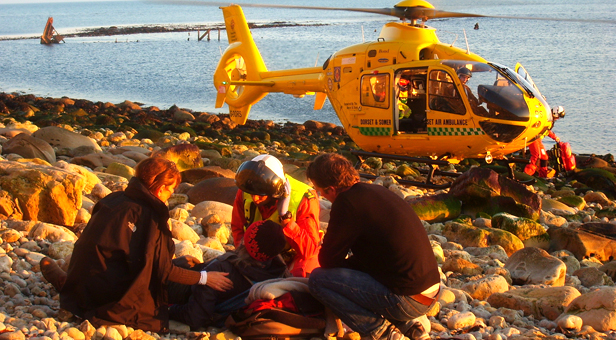Dorset and Somerset Air Ambulance has purchased three new simulation manikins as part of their vision to provide maximum patient benefit to the people of the two counties.
The manikins, all realistic in size and weight, will have a large part to play in the training and development of the charity’s paramedics who began a University of Hertfordshire’s MSc Advanced Paramedic Practice (Critical Care) Programme earlier this year.
‘SimMan Essential’ (with patient monitor), ‘Crash Kelly’ and ‘Newborn Anne’ have become the latest members of the team.
‘SimMan Essential’ is a wireless patient simulator and offers comprehensive clinical functionality to teach the core skills of airway, breathing, cardiac and circulation management. The added realism helps the air ambulance crew to practise life saving drills and skills, both in the classroom and in the tricky environments that they may encounter, thanks to its portability and wireless nature. It also features a variety of eye movements and pupil dilation levels, simulated spontaneous breathing and abnormal breathing sounds, vascular access, manual drug recognition and a number of cardiac features to name a few. The wireless touch screen simulated patient monitor provides clinical feedback.
‘Crash Kelly’ is a durable, rugged training manikin. The head can be tilted forward, backward or rotated 90 degrees to either side.
‘Newborn Anne’ is designed for skills training in neonatal resuscitation. Its features are designed to focus on the critical and the resuscitation skills required in the first ten minutes of a newborn baby’s life. Anne accurately represents a full term (40 week) newborn female measuring 21 inches and weighing 7lb.
A team of specialist doctors and consultants from across the region are providing education and training as part of the Advanced Paramedic Practice (Critical Care) Programme and agree that simulated learning is a critical component to their success.
Dr Farhad Islam, Consultant in Emergency Medicine at Royal Bournemouth Hospital said, “These simulation tools will provide the paramedics with scenarios and emergency critical incidents which can be tailored and modified quickly in preparation for real patient encounters.
“A critically ill patient’s condition can change in a matter of seconds, so being able to react quickly and precisely is paramount. The mannequin is similar to the ones we use in hospital to teach doctors and is particularly useful for practising less frequently encountered but critical life saving procedures, as well as improving team working skills with an added sense of realism.”
Providing such tools come at a cost (just over £40,000) and with no direct Government or National Lottery funding, the charity relies on the public to help it raise the funds to purchase items such as these.
Bill Sivewright, Dorset and Somerset Air Ambulance Chief Executive Officer said, “It is vital that we maintain our focus on continuing to deliver the highest quality patient care for the people in Dorset and Somerset. We believe that the training value of these simulation tools, and the direct benefit to our patients that they offer, make them a valuable investment in the future of our service.”
Dorset and Somerset Air Ambulance has attended more than 9,350 emergencies since its launch in March 2000, saving many lives and aiding recovery with outstanding immediate care and rapid delivery to the hospital best suited to meet the patient’s needs.
More information about the Dorset and Somerset Air Ambulance can be found at www.dsairambulance.org.uk or by calling: 01823 669604.







